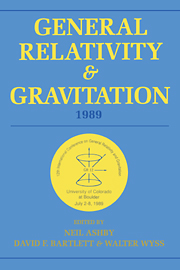 General Relativity and Gravitation, 1989
General Relativity and Gravitation, 1989 Published online by Cambridge University Press: 05 March 2012
Though historically, the solar system has been the principal area for testing theories of gravitation, we seem to be at the end of the golden age of solar-system tests (Reasenberg (1987)). The classical effects have now been measured within the limits of today's technology and further significant improvements cannot be expected in the near term. Future space-based experiments such as GPB, Gravity Probe B; LAGOS, Laser Gravitational-Wave Observatory in Space; and POINTS, the (proposed) Astrometric Optical Interferometer, await further technological as well as engineering developments and logistic (launch) support to deliver them to the laboratory of space.
Recent years have seen, however, ground-based gravitational experimentation undergo a resurgence, driven by new experimental capabilities and by new theoretical work. The question that was raised by Fischbach et. al. (1986) of a possible short-range gravity force, dubbed the “Fifth Force,” has been particularly important. Though the experiments that gave rise to this suggestion have, in retrospect, turned out to be less compelling than was originally thought, the gravitational physics community has been forced to recognize the possibility of a short-range gravitational interaction.
This suggestion lent itself to fairly straightforward testing and the experimental community responded with great enthusiasm and ingenuity. Now some five years later, though it appears that this quite plausible theoretical suggestion has been ruled out by experiments at the level which initially was suggested. Nevertheless it gave rise to a rather exciting period in gravitational physics.
To save this book to your Kindle, first ensure [email protected] is added to your Approved Personal Document E-mail List under your Personal Document Settings on the Manage Your Content and Devices page of your Amazon account. Then enter the ‘name’ part of your Kindle email address below. Find out more about saving to your Kindle.
Note you can select to save to either the @free.kindle.com or @kindle.com variations. ‘@free.kindle.com’ emails are free but can only be saved to your device when it is connected to wi-fi. ‘@kindle.com’ emails can be delivered even when you are not connected to wi-fi, but note that service fees apply.
Find out more about the Kindle Personal Document Service.
To save content items to your account, please confirm that you agree to abide by our usage policies. If this is the first time you use this feature, you will be asked to authorise Cambridge Core to connect with your account. Find out more about saving content to Dropbox.
To save content items to your account, please confirm that you agree to abide by our usage policies. If this is the first time you use this feature, you will be asked to authorise Cambridge Core to connect with your account. Find out more about saving content to Google Drive.